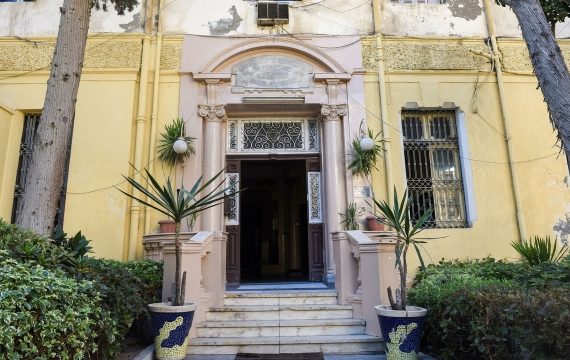
The Economist
By Nicolas Pelham
April 4, 2019
Arab dictators seeking Western approval are not the only ones

It is simply called “the villa”. Its white walls have no markings and an official permit is pending. For its founders, though, the low-key opening of the Arab world’s first new synagogue in generations signals the dawn of a Jewish revival. Standing near the beach-front in Dubai, the synagogue offers Hebrew classes and kosher catering and has just acquired a rabbi. “The promise of our community is the rekindling of a Judeo-Islamic tradition,” says Ross Kriel, president of the new Jewish Council of the Emirates.
That may sound unduly hopeful in the Arab world, which uprooted its 800,000 Jews in the decades after the creation of Israel. But, surprisingly, Arab leaders from Morocco to Iraq are repeating the message. In February Egypt’s president, Abdel-Fattah al-Sisi, said he would build new synagogues if the country’s Jews returned. His government is restoring the Eliyahu Hanavi synagogue in Alexandria (pictured), once the Middle East’s largest. It is also cleaning up the vast Jewish cemetery, flooded with sewage, in southern Cairo. And for the second time under Mr Sisi, Egyptian television has scheduled a soap-opera about Jews to run during the Muslim fasting month of Ramadan. It tells of a soldier’s steamy affair with a Jewish woman.
Others in the Gulf are following Dubai’s lead. “I feel more comfortable wearing a kippa in Bahrain than Berlin,” says Marc Schneier, an American rabbi working to “develop Jewish life” in five Gulf states. The Muslim World League, Saudi Arabia’s missionary arm and long a bullhorn of bigotry, marked Holocaust Day with a letter in Arabic condemning Holocaust denial. Muhammad al-Issa, its head, plans to lead a multi-faith delegation to Auschwitz. “Circumstances have changed,” he says.
After decades of hate speech, cynics deride this volte face as a publicity stunt by Arab dictators seeking Western approval. But the Arab spring in 2011 swept away a host of taboos. People challenged long-standing state ideologies as never before. From Iraq to Libya, a swathe of politicians, film-makers and academics, from secular types to the Muslim Brotherhood, have been re-examining the past, including the post-1948 eviction of Jews.
Released from the fear of the censors, the internet has enabled Muslims and Jews to leapfrog borders and passport controls. Virtual communities have grown online. “I talk to friends in Baghdad all night,” says an Iraqi Jew in London who left Baghdad in the 1960s. Last year a popular Arabic Facebook site ran a poll on whether to restore Iraqi citizenship and the right of return to Jews exiled 70 years ago. Over three-quarters of the 62,000 participants voted yes.
Television, books and student campuses reflect this cultural shift. Arab documentaries search for Jewish diasporas that once lived in Arab lands. A new generation of Arab novelists elevates Jews from bit-players to centre-stage. “I wrote it to show that Jews are part of our culture,” says Amin Zaoui, the Algerian author of “The Last Jew of Tamentit”. The Arabic translation of Lucette Lagnado’s “The Man in the White Sharkskin Suit”, the memoir of an Egyptian Jew, has had multiple reprints.
Hebrew departments in Arab universities, once the preserve of would-be spooks, have mushroomed. Today 13 Egyptian universities teach Hebrew, up from four in 2004. Some 3,000 Egyptian students will finish their Hebrew studies this year, double the number five years ago. Even Syria’s state news agency has a Hebrew website.
For all this reappraisal, the Arab world today is a far cry from the early 1950s, when Egypt’s first president, Muhammad Naguib, went to synagogue on Yom Kippur and Muslims prayed next to Christians and Jews at the graveside of Moses Maimonides, a medieval rabbi, in Cairo. From Tlemcen in western Algeria to Qamishli in Syria’s north-eastern corner, ornate ancient synagogues rot away. “They’ll take everything when we die,” says one of the last Jews in Damascus. Under the guise of preserving Jewish heritage, some outfits backed by Arab governments plan to seize disused property. The old invective dies hard. “They don’t need a second homeland,” said a Salafist, after an Algerian minister suggested reopening the synagogues.
Still, spikes in tension over Israel no longer spark anti-Jewish pogroms. Some Palestinian politicians still whip up anti-Jewish feeling, but many speak Hebrew and have greater awareness and understanding than before. A surprising number of researchers uncovering the Middle East’s Jewish past are Palestinian. Some even speak of a common fate with dispossessed Arab Jews. “We’re entering an age of post-colonialism,” says a Christian cleric from Cairo. “We’re again learning how to see richness in others, not threats.”
This article appeared in the Middle East and Africa section of the print edition under the headline “Old ties, new interest”
Copyright © 2025 Foundation For Ethnic Understanding. All rights reserved. | Privacy Policy